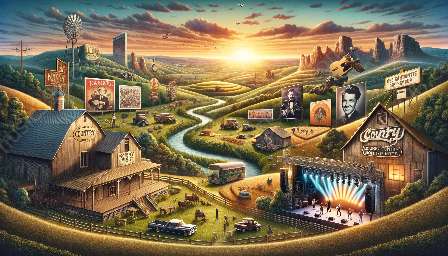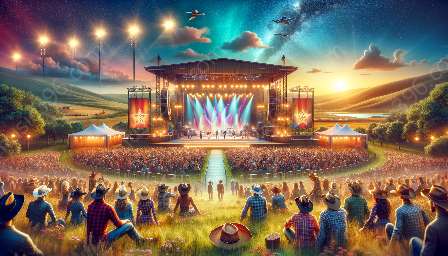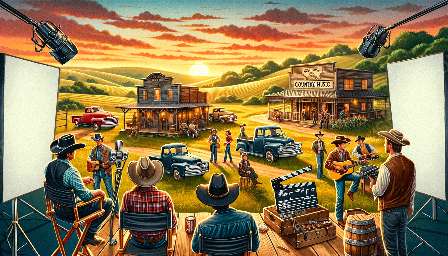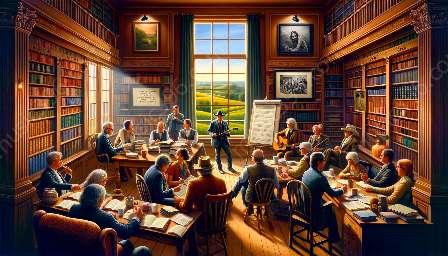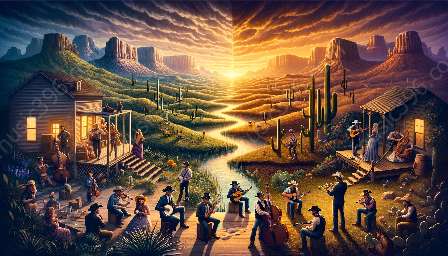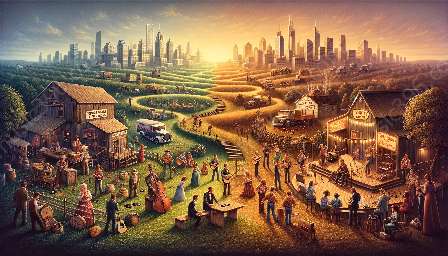Country music, deeply rooted in tradition and storytelling, has thrived as a reflection of society's values, struggles, and triumphs. It has evolved alongside defining events in America's history, portraying the changing landscape of the nation in its lyrics and melodies. This exploration delves into the intricate relationship between country music and society, shedding light on how this genre has mirrored, shaped, and been shaped by societal dynamics.
Defining Events in Country Music Chronology
Country music, with its origins in the rural regions of the United States, has progressed through several defining events that have left an indelible mark on the genre's evolution.
The 1927 Bristol Sessions marked the birth of recorded country music, capturing the essence of Appalachia and igniting the genre's journey into the mainstream. Following the Great Depression, country music served as a source of solace for many Americans, lending a voice to the hardships and economic turmoil of the era. World War II saw country music embrace patriotic themes, reflecting the sentiments of a nation at war.
The emergence of television in the 1950s provided a platform for country music to reach wider audiences, paving the way for icons like Hank Williams and Patsy Cline to captivate millions with their timeless tunes. As the civil rights movement gained momentum, country music grappled with societal changes, with artists like Johnny Cash using their platform to advocate for social justice.
The 1980s witnessed the 'Urban Cowboy' phenomenon, blending country music with pop sensibilities and introducing a new wave of listeners to the genre. In the aftermath of 9/11, country music once again reflected the nation's collective grief and resilience, producing poignant songs that addressed the impact of the tragedy on American society. The advent of social media in the 21st century propelled country music into the digital age, enabling artists to connect with fans on a global scale and adapt to the rapidly evolving technological landscape.
Country Music: A Mirror of Society
Country music serves as a mirror reflecting the values, challenges, and aspirations of society. Its lyrics often depict the experiences of everyday people, addressing themes of love, heartbreak, perseverance, and pride in one's heritage. The genre's storytelling prowess allows it to encapsulate the essence of rural life, capturing the essence of familial bonds, hard work, and the resilience of rural communities.
Moreover, country music has been a powerful platform for discussing societal issues, from poverty and inequality to patriotism and national identity. Artists have used their songs to shed light on pressing matters, sparking conversations about social justice, economic disparity, and the American dream.
Throughout history, country music has catalyzed conversations about cultural shifts, from the changing roles of women in society to the complexities of race relations. The genre's ability to adapt and embrace diverse perspectives has positioned it as a dynamic reflection of society's ever-changing landscape.
Impact of Society on Country Music
Society has played a profound role in shaping the trajectory of country music. The genre's evolution has been intrinsically linked to societal movements, cultural shifts, and political upheavals. As social dynamics evolved, country music responded by incorporating new themes, musical styles, and narratives, ensuring its relevance across generations.
Furthermore, the fusion of country music with other genres has been influenced by societal inclinations, leading to the emergence of sub-genres like country rock, outlaw country, and country pop. These evolutions in style and sound are a testament to the genre's adaptability in the face of societal changes.
Notably, the impact of technology and globalization has reshaped country music, allowing it to transcend geographical boundaries and resonate with audiences worldwide. The genre's ability to connect with listeners from diverse backgrounds underscores its enduring appeal and capacity to bridge cultural divides.
In Conclusion
Country music stands as a resilient reflection of society, encapsulating the essence of American life and the shared experiences of its people. From the roots of its inception to the present day, this genre has upheld its role as a poignant storyteller, chronicling the ebb and flow of societal dynamics. As country music continues to evolve, it will remain deeply intertwined with the fabric of society, serving as a timeless testament to the human experience.










